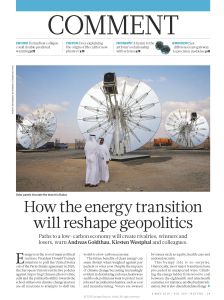
How the Energy Transition Will Reshape Geopolitics
Paths to a low-carbon economy will create rivalries, winners and losers, warn Andreas Goldthau, Kirsten Westphal and colleagues.
Recommendation
Whether your car runs on gas or electricity, or whether the power that comes out of your socket is solar or coal-generated, may be inconsequential to the end-consumer, but they can have a huge impact on the countries that supply the raw materials. In a series of meetings funded by the German Foreign Office, an international team of researchers discussed the ways in which the global energy transition will impact international peace and security. Four scientists who took part in the discussions share the main conclusions of the meetings in the journal Nature. Policy makers and anybody involved in the climate debate will want to learn how the energy transition can be used to promote a more peaceful and equitable world.
Summary
About the Authors
Andreas Goldthau is professor of international relations at Royal Holloway, University of London, UK. Kirsten Westphal is senior associate in the Global Issues Division at the German Institute for International and Security Affairs (SWP), Berlin, Germany. Morgan Bazilian is director of the Payne Institute and a professor of public policy at the Colorado School of Mines, Golden, Colorado, USA. Michael Bradshaw is professor of global energy at Warwick Business School, University of Warwick, Coventry, UK.







Comment on this summary